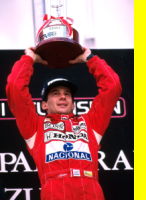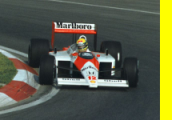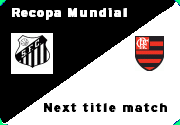 |
FIFA Club World Cup 2010 - Breakthrough time for the Rest of the World?
|  |
|
Posted 12.12.2010 by Mark de Vries
As you may have noticed, FIFA's end-of-year event, the Club World Cup, is underway in Abu Dhabi. For the 50th time a club is to be crowned "World Champion", either officially, or semi-official
as the vast majority of those "world title" contests were held under the banner of the Intercontinental Cup. Even though it's been a decade since FIFA kicked off their official competition, which
IS open to other confederations' champions, no final has ever featured a side from outside South America or Europe. The score is 25-24 in CONMEBOL's favour, though the Europeans have had the upper
hand in recent years and most bookmakers would expect the UEFA candidate to level the scores this time around.
So I'm going to use this little corner of the interweb to make a fool out of myself once again, and predict Inter won't win it. Neither of them, in case you were expecting an already frequently made
comment on the main participants from either side of the Atlantic. Hindsight is a beautiful thing, and it was only another crazy week at work that prevented me from posting this before the quarter-finals, or I'd have put my money on Pachuca. Nevertheless, the feeling that neither Internazionale nor Internacional will deliver this year is strong. The Nerazzurri are struggling under their new
manager Rafael Benitez and find themselves in 7th in Serie A at the time of writing. As for the Colorado, well, they too are 7th in Serie A. The difference being
that the Brazilian version actually finished last week. So that means neither of them are/were on top form.
Alright, in years gone by, you probably didn't have to be in order to get the better of the also-rans, yet times are changing as the margin of victory and/or the amount of goals conceded at
the semi final stage by the eventual tournament winner has shown in recent years. One day, putting in less than 100% in the semi final will demote you to a battle for third place. The question is:
Who is capable of punishing such an off-day? As I mentioned, Pachuca were my guess. But then, if one uses the argument of the pair of Inters only being 7th in their league, why expect the Mexicans
to topple them, when the Tuzos themselves could come only 7th in the overall table of the lastest domestic campaign?
The short answer to that is that Mexican clubs continue to give South Americans a run for their money in CONMEBOL competitions. They probably would have in the Club World Cup semi as well, but as
we've seen, Tout Puissant Mazembe got the better of Pachuca in the quarter final. The Congolese side also failed to win their domestic league this year, but at least they have something of a valid
excuse in the structure of their national championship (a series of group stages, with the title decided in a four-team round-robin competition in which their six matches were spread out over about
3½ months). TP Mazembe came second, on goal difference and unbeaten. They were pretty stubborn in the quarter final clash, so who knows how long they're able to frustrate Internacional on Tuesday.
Seongnam Ilhwa Chunma complete the line-up for the semi finals. Despite being record champions (7 times) of Korea's K-League, they too didn't go into this tournament as domestic champions,
nor do they still have a chance at winning this (calendar)year's league. Yet their style of quick, counter-attacking football should pose a bigger threat to Internazionale than Mazembe's approach,
which IMHO is better suited to take on the Brazilians. So as far as I'm concerned, both semi finals will be tricky for the favourites. If only one of them fails, it will be quite a breakthrough for
the rest of the world. Asia have the best record among them, with more third place finishes than the other continents put together since the current format started in 2005. On that basis, I'm going
to jinx Chunma by backing them to cause the biggest surprise in the tournament's history.
|
|
|
 |
|
 |
|
| |
 |
2010/2011 at last!
|  |
|
Posted 11.08.2010 by Mark de Vries
A month after the Battle of Johannesburg, the new (European) club season is now starting to get underway properly. A few domestic Super Cup contests have taken place already, some
more of those curtain-raisers are set to follow in the coming weeks, but above all, League action returns to us. Tribalism, the perfect antidote after a summer of nationalism one could say. ;-)
Despite the big event in South Africa, there have actually been some league and cup decisions across the world during June and July. Now that the Oosterpark Rankings return from summer recess,
those outcomes have been included in the all-time rankings.
Furthermore, new league ratings for UEFA and CONCACAF (excluding Mexico) have been calculated. No major changes in ratings took place, but it is worth mentioning that Italy have lost their 100
points rating for the first time in over a generation. Internazionale's Champions League triumph couldn't disguise the fact that Italy's performances have dropped off in recent years. At the same
time, Germany has improved at club level, to the extent that they are now rated on a par with the Italians. Both leagues will have their 2010/11 title rated at 95 points.
The 2010 top flight membership bonus points were also processed for all applicable leagues. Finally, some minor data holes were plugged, for instance in the case of the Libyan Cup roll of honour
which had contained some blanks until now. Another few historical corrections are currently under investigation.
|
|
|
 |
|
 |
|
| |
 |
Glory Days [posted 15.01.2010, archived 05.04.2010] |
 |
|
Barcelona's most glorious year saw them win six out of six available trophies. Even Real Madrid at their peak couldn't do the Treble of European Cup, La Liga and Copa Del Rey (which would've
been quite something in the absence of a Rey but that's beside the point), yet Barca made it look relatively easy, save for their CL semi final against Chelsea. Just for good measure, they added
the Spanish and European Super Cups at the end of the summer and went on to clinch the Club World Cup in December. All in all, that took their points haul for the calendar year to 760, making it
the highest scoring year in Oosterpark Rankings history.
The Catalan giants outperformed Manchester United's Class of 1999 by 10 points. A decade ago, United also secured the Treble, which included
an FA Cup rated 30 points higher (at the time) than the Spanish Cup this year, but Barcelona made up for that by wining their domestic and continental Super Cup. Furthermore, the 2009 Club World Cup win was
rewarded by a higher number of points than United's Intercontinental Cup triumph in '99.
The top-20 of most successful years in terms of Oosterpark Rankings points reads as follows:
1. Barcelona (2009) 760 points
2. Manchester United (1999) 750
3. Ajax (1972) 740
4. Sao Paulo (1993) 710
5. Celtic (1967) 671
6. Olimpia (1990) 630
7. Internazionale (1965) 602
=. Ajax (1995) 602
9. Manchester United (2008) 600
10. Real Madrid (1960) 587
11. Ajax (1973) 582
12. Real Madrid (1957) 580
13. Bayern München (2001) 565
14. PSV (1988) 557
15. Liverpool (1984) 544
16. FC Porto (2004) 543
17. AC Milan (1994) 541
18. Barcelona (2006) 540
19. Liverpool (1977) 537
20. Bayern München (1976) 529
|
|
|
 |
|
 |
|
|
|
|
|
 |
Saudade [posted 03.03.2010, archived 23.03.2010] |
 |
|
 It takes a very special occasion for clubworldrankings.com to feature something different than association football. This month, such an event
occurs. For the 21st of March marks the 50th birthday of Ayrton Senna da Silva, my childhood hero. It takes a very special occasion for clubworldrankings.com to feature something different than association football. This month, such an event
occurs. For the 21st of March marks the 50th birthday of Ayrton Senna da Silva, my childhood hero.
Back in the day, I followed motor racing in general, and Formula 1 in particular, religiously. Not a practice or qualifying session missed,
regardless of the ungodly hour they were on, that kind of thing. Football came a distant third, still behind handball which I played myself
at the time.
On that fateful Sunday, May 1, 1994, we had a handball match in a village near the city were I live. Our fifth (junior) league title in a row was all but
wrapped up at the time, and I had already started to lose interest in the game. Following the
death of Roland Ratzenberger at Imola the day before, and Rubens Barrichello's accident on Friday which could so easily have been fatal as well,
something in the back of my head told me I had to watch the race. I feigned injury to justify pulling out of the game.
 Even 16 years on, I recall almost every second of the events leading up to 2.17pm... Pedro Lamy's Lotus slamming into the back of J.J. Lehto's stalled Benetton on
the grid, debris flying everywhere, the safety car coming out, and that strange feeling the drama was far from over... Yet at no point did
it ever even cross my mind something could happen to Senna himself. He was invincible, infaillible, untouchable, and if not immortal, most
definitely out of this world. Even 16 years on, I recall almost every second of the events leading up to 2.17pm... Pedro Lamy's Lotus slamming into the back of J.J. Lehto's stalled Benetton on
the grid, debris flying everywhere, the safety car coming out, and that strange feeling the drama was far from over... Yet at no point did
it ever even cross my mind something could happen to Senna himself. He was invincible, infaillible, untouchable, and if not immortal, most
definitely out of this world.
As the safety car pulled in at the end of lap 5, I was pleased with the way Ayrton kept Schumacher at bay, and sad that the race that would
kickstart his title challenge was overshadowed by events so far. A minute-and-a-half later, with Gerhard Berger's 1989 crash in that same
cursed Tamburello corner burnt into my retina, a sickening mix of deja-vu and pure disbelief took over...
The words of Dutch TV commentator Olav Mol still echo in my ear from time to time... "En Senna gaat eraf, Ayrton Senna schiet eraf....
op een volgas positie gaat Ayrton Senna ra-de-loos rechtdoor! Mijn god wat gebeurd hier allemaal!" The point would be lost in translation, and
at any rate no words could describe the feeling.
 In this time, when mobile telephones and broadband internet (or indeed any kind of internet connection) hadn't yet reached our neck of the woods,
we relied on traditional media to keep us up to date. Some reports suggesting Ayrton was ok(ish) conflicted with the pool of blood we saw on TV,
but we clung on to them. When shortly after 6pm the news of his death broke, it thus hit twice as hard... In this time, when mobile telephones and broadband internet (or indeed any kind of internet connection) hadn't yet reached our neck of the woods,
we relied on traditional media to keep us up to date. Some reports suggesting Ayrton was ok(ish) conflicted with the pool of blood we saw on TV,
but we clung on to them. When shortly after 6pm the news of his death broke, it thus hit twice as hard...
The only man I ever looked up to was dead. The world had lost not only the greatest ever Grand Prix pilot (forget the bare statistics, I've heard countless arguments how Schumacher is statistically the best ever, but until I lost interest in it
a few years ago, with the German on six world titles, Senna actually headed an all-time ranking I used to do on Grand Prix drivers, based on
formulas that take the strength of the field one is up against into the equasion as well), but a great man away from the track as well.
 His love for his country and fight against social inequality were inspiring. Thankfully, his ideals are further pursued by the Instituto Ayrton
Senna, under the guidance of his sister Viviane. Nevertheless, it should've been Ayrton himself overseeing the projects that open the door to a
better life for millions of children. For a man so deeply religious, it must have been divine intervention that took Senna from a world so
much poorer without him. If there's a man upstairs, he better reserve pole position at the eternal racing track for him.
His love for his country and fight against social inequality were inspiring. Thankfully, his ideals are further pursued by the Instituto Ayrton
Senna, under the guidance of his sister Viviane. Nevertheless, it should've been Ayrton himself overseeing the projects that open the door to a
better life for millions of children. For a man so deeply religious, it must have been divine intervention that took Senna from a world so
much poorer without him. If there's a man upstairs, he better reserve pole position at the eternal racing track for him.
It wasn't just Senna's death that made 1994 the blackest year in my life, but it is the last of the negative chain of events of that year I've
come to terms with, and only recently. That most untranslatable of Portuguese words "saudade" pretty much covers it. Will you join me in burning
a candle on the 21st?
|
|
|
 |
|
 |
|











